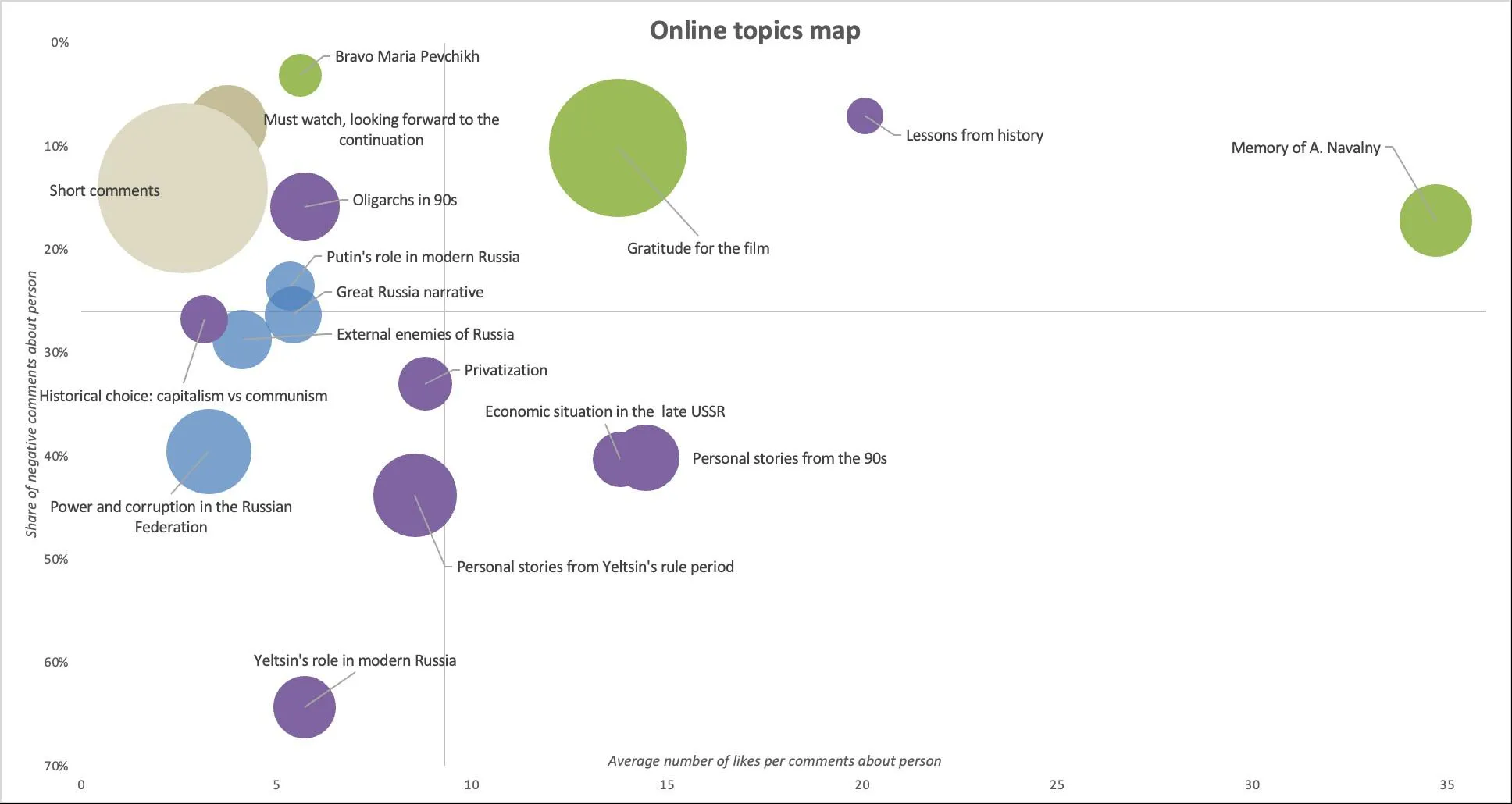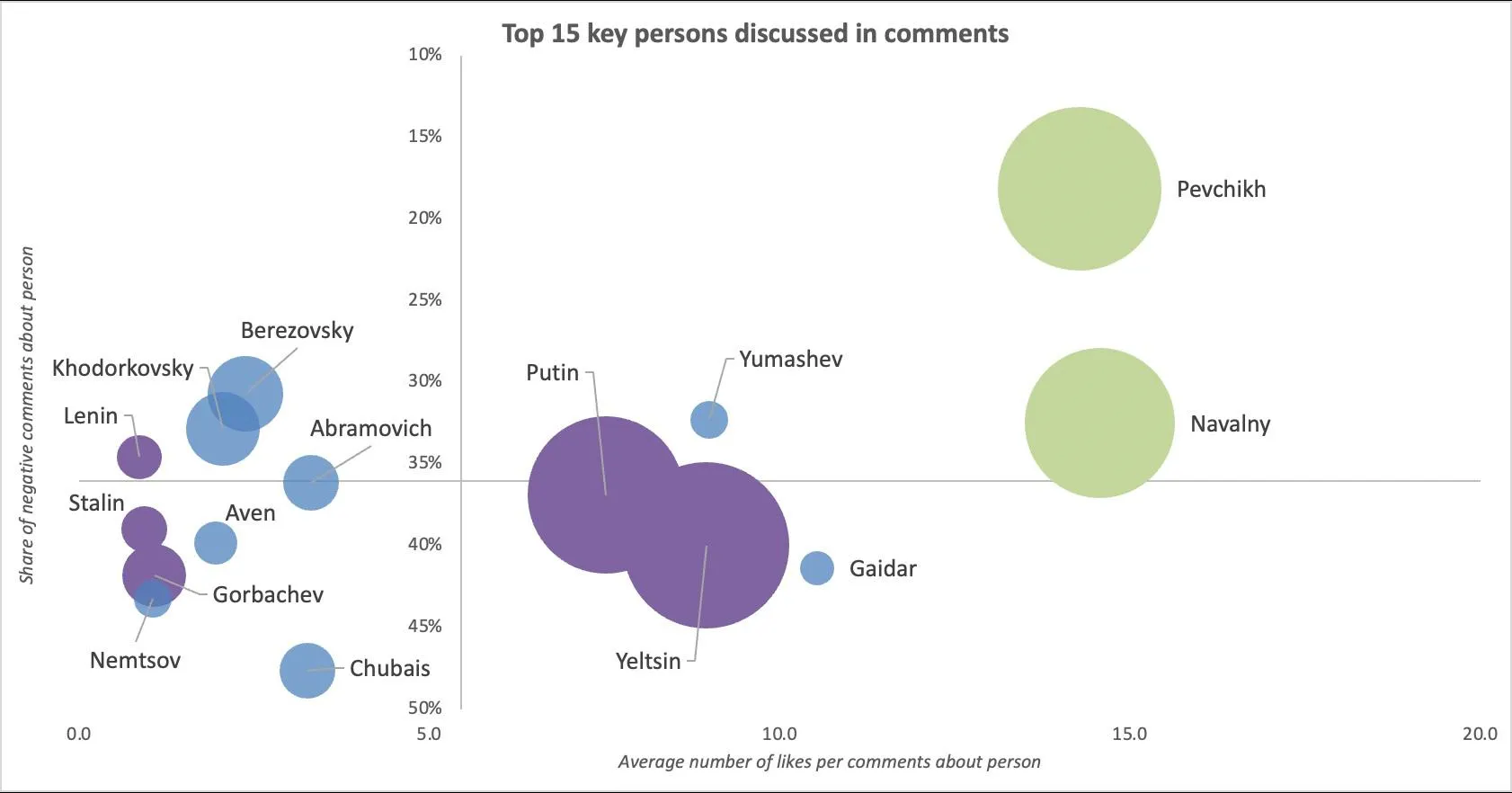29 May 2024
The Traitors: Why viewers are thanking Maria Pevchikh and slamming Boris Yeltsin
Dr Olga Logunova and Georgii Vlasov
The presented analysis focuses on public comments on the YouTube platform under the first episode of the new documentary series 'The Traitors'.

This documentary, produced by Alexey Navalny's Anti-Corruption Foundation and narrated by Maria Pevchikh, delves into corruption among high-ranking politicians in the 1990s. The series has sparked significant discussion about the 1990s in Russian society, examining how the country lost its way following the collapse of the Soviet Union. According to the filmmakers, Russia had the potential to evolve into a rules-based democracy, but this was thwarted by those entrusted with the people's aspirations.
While it might seem that historical events like privatization and oligarchs or Soviet and post-Soviet history are solely at the heart of these discussions, one of the largest bloggers, Yuri Dud, mentioned this in his interview with Mikhail Khodorkovsky. The series also serves as effective PR for the Anti-Corruption Foundation (FBK) and Maria Pevchikh herself.
To understand the extent of public engagement with the series, a total of 31,988 public comments under the first episode were collected. Automatic text analysis algorithms,including topic modelling, named entity recognition, and sentiment analysis, were employed. Key metrics used in the analysis included the number of mentions (share of voice), the sentiment of the comments (focusing primarily on the share of negative comments), and the engagement per comment (average number of likes). This approach provided a comprehensive view of how the audience interacts with and perceives the content and its key figures.
Main online conversation topics

The topics discussed in the YouTube comments on The Traitors documentary vary widely in terms of their share of voice and engagement. "Gratitude for the film" has the highest share of voice at 18 per cent, indicating that a significant portion of the audience appreciated the documentary and felt compelled to express their thanks. Despite its prominence, this topic does not generate as high engagement per comment, averaging 13.75 likes, as more specific, emotionally-charged topics.
In contrast, discussions about the historical and political context of the 1990s, such as 'privatisation' (three per cent share of voice) and 'oligarchs' (four per cent share of voice), receive relatively less attention. These topics, while crucial to the documentary's narrative, appear to engage a smaller, perhaps more niche audience. Similarly, topics like 'Yeltsin's role in modern Russia' and 'personal stories from the 90s' hold shares of four per cent each, showing that while these are relevant discussions, they do not dominate the conversation.
The 'memory of Alexei Navalny' and 'personal stories from the 1990s' have average engagements of 34.7 and 14.5 likes per comment, respectively. These topics resonate deeply with the audience, indicating strong emotional connections and a high level of interest.
This distribution suggests that viewers are more inclined to comment on their overall appreciation of the film and share personal anecdotes or reflections on specific figures like Navalny and Pevchikh, rather than delve deeply into the historical analysis of the 1990s. The emphasis on gratitude and personal stories reflects a tendency among viewers to connect with the documentary on a personal level, perhaps finding it easier to relate to contemporary figures and their narratives over the more distant and complex historical events of the post-Soviet era.
Sentiment analyses for conversational topics
The share of negative sentiment varies significantly across topics discussed in the YouTube comments on The Traitors documentary. 'Yeltsin's role in modern Russia' has the highest share of negative comments at 64 per cent, reflecting substantial public discontent with his legacy. Similarly, 'Power and corruption in the Russian Federation' and 'Economic situation in the late USSR' both have 40 per cent negative sentiment, highlighting ongoing frustrations with past and present governance issues. On the other hand, topics that align with pro-state discourse, such as 'Great Russia narrative' and 'Putin's role in modern Russia,' exhibit lower negative sentiment, at 26 per cent and 24 per cent respectively, indicating a more favorable view towards these themes among certain segments of the audience. Discussions about 'oligarchs' surprisingly show less negativity, with only 16 per cent of comments reflecting disapproval.
In contrast, positive topics such as 'bravo Maria Pevchikh' and 'gratitude for the film' have much lower shares of negative sentiment, at three per cent and 10 per cent respectively. This indicates favorable perceptions and appreciation among viewers towards the film and its creators. The general positive reception of these topics highlights the viewers' support for the documentary's narrative and the efforts of those involved in its production. This contrast in sentiment across different topics underscores the varied responses from the audience,influenced by their perceptions of historical and current events, as well as the individuals involved in these narratives.
Key persons discussed
The leaders by mention include Boris Yeltsin, Maria Pevchikh, Vladimir Putin, and Alexey Navalny, mentioned in 7.7 per cent to 9.5 per cent of comments.

Pevchikh and Navalny have the highest engagement rates, around 15 likes per mention. Navalny's high engagement and frequent mentions reflect the public's emotional response to his death in February 2024. This event elevated his status as a martyr for anti-corruption,spurring international condemnation and calls for accountability, further boosting his profile.
Maria Pevchikh's high engagement and mentions are due to public gratitude for her role in creating the documentary. Boris Yeltsin and Vladimir Putin are frequently mentioned but generate slightly different sentiments. Yeltsin's mentions are generally more negative, likely due to dissatisfaction with the political and economic turmoil during his presidency. In contrast, Putin's mentions, while also negative, reflect the contentious nature of his long-term rule and ongoing policies. Both figures receive significant engagement ( 7.5 and 9 likes respectively).
1990s business and political elites are discussed less. Berezovsky and Khodorkovsky have fewer and less negative mentions compared to Chubais, who has the highest negativity (48 per cent) due to his controversial economic reforms. Yumashev and Gaidar, despite fewer mentions, have high engagement levels similar to Yeltsin, often mentioned in conjunction with him.
Interestingly, prominent figures from the early Soviet era, Lenin and Stalin, are mentioned alongside the participants in the film's events, whereas current politicians of modern Russia (Mishustin, Shoigu, Kiriyenko) are minimally mentioned. This minimal mention indicates a focus on historical figures over contemporary ones, reflecting the documentary's emphasis on the 1990s.
The fact that Lenin and Stalin are mentioned at similar rates to the film'ssubjects highlights the enduring impact of Soviet-era leaders on Russian historical consciousness. This persistent interest in early Soviet figures underscores the complex legacy of Russia's political history and its ongoing influence on contemporary discussions.

